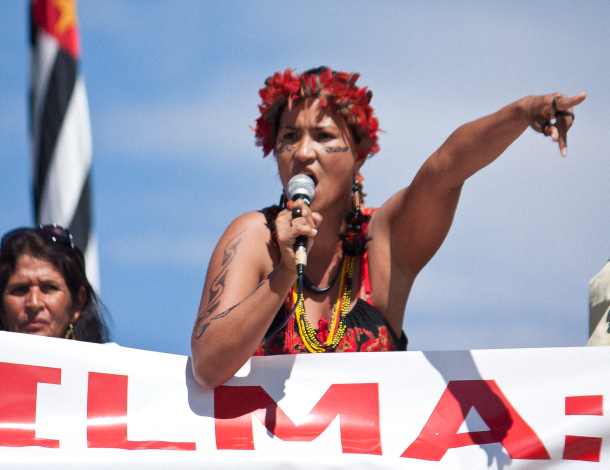Abortion has long been criminalized in Brazil, and barely figures into the mainstream leftist political agenda. It is an issue that many have all but given up on - but not the feminist movements.
The battle over the criminalization of abortion is revealing of the overall political scenario in Brazil. Criminalizing and controlling gender and sexuality is the moral foundation of the growing right-wing ideology that is driving the country’s political development. With a political system weakened by corruption and collusion, the battle for abortion is now playing out on the internet through individuals, movements, and even web robots (also known as ‘bots’).

In Brazil today, political institutions have been weakened to their most vulnerable since the military dictatorship ended 30 years ago. Women make up less than 10% of elected political representatives, placing Brazil amongst the worst in the world for gender equality in politics. The country’s first and only female president, Dilma Rousseff, was deposed by a political coup in 2016, showing the severe sexism and institutional collusion in the political system.
The frontrunner for 2018’s presidential elections and Rousseff’s predecessor, Luiz (Lula) Ignácio da Silva, is currently on trial for corruption*. Almost 46% of the Brazilian population believe that this is an unfair trial by the media and judiciary in order to invisibilize his election.
At the same time, targeted gender-based violence is on the upswing. On March 14th, 2018, Marielle Franco, a city councilwoman in Rio de Janeiro was assassinated. Black, lesbian, from the favela, her murder has caused outrage in Brazil and beyond. Her openly feminist, black and favela-centered politics were a source of hope for marginalized groups in Rio de Janeiro, currently governed by a conservative city government and an evangelical mayor.
Lack of access to information plays a big role in the weakness of democracy in Brazil today. Eleven families control mainstream channels of communication. Meanwhile, civil society organizations point to insufficient information on human rights and basic political mechanisms, especially for the most marginalized groups and communities. The majority of the population receive their information from television, which is dominated by O Globo, known to be biased, particularly in its coverage of Dilma Rousseff’s trial and impeachment.
As a result, the internet has become the main battle ground over information and civic dialogue on politics. Brazil is the largest user of social media in the world, after the United States, and lengthy, passionate, and even violent discussions about politics over Facebook, Twitter and Whatsapp are not uncommon. In this little understood but widely used new frontier, citizens are staking their political claims, as there is a general perception of the uselessness of their formal political participation.
But online hate speech and gender based violence are also on the rise in Brazil. ‘Trolling’ - or attacking an individual or an ideology in an unified and unilateral way – has greatly increased in Brazil. A 2016 study showed that 84% of the comments on social media platforms that addressed politics, women, race and LGBTQ were negative. Of nearly 50,000 comments that involved different aspects of gender inequality, 88% showed intolerance.
Movimento Brasil Livre (MBL – Movement for a Free Brazil) is one of the most prominent right-wing Brazilian movements to have emerged with an internet presence. MBL has been vocal with enormous protests, events, and campaigns for Dilma Rousseff’s impeachment, ahead of and during her trial, as well as for a “corruption-free” Brazil.
Moreover, there is speculation about the amount of fake profiles and bots being used to spread hateful messages in this way. This has directly resulted in consistent condemnations and removals of feminist Facebook pages, Instagram handles, and profiles. Nor is it restricted to Brazilian public figures – when Judith Butler, a well-known and regarded scholar on sexuality and author of the term 'queer' arrived in Brazil last year to speak at a conference, she was harassed and almost physically attacked by right wing Brazilians.
As in other parts of the world, for at least the last decade, the increasingly successful right-wing tactic in politics has been to mobilize around patriarchal, heteronormative conceptions of the family, and refer to gender as ‘gender ideology’. This has proven to be a longer-term, more successful and insidious strategy than simply waging a direct war on feminist movements. Building their arguments on the presumption that gender ideology is false and damaging, politicians have explicitly prohibited the word ‘gender’ to even appear in school curriculums across the country.
‘Escola Sem Partida’ (- School Without Party), a self-described “educational freedom movement” works to prevent any mention of gender and sexuality in schools or even discussed informally. While homosexual marriage is legal, a new Statute of the Family passed recently ensures that the conception of ‘family’ is understood to be the union of a heterosexual man, woman, and their child.
Far from being isolated incidents, a united front of fundamentalist politicians calling themselves the ‘Evangelical Front’ has strategically created an agenda that attacks liberty of gender and sexual expression in the country. Outside of organized politics, there have been instances of this in the realm of arts and culture. For example, an exhibit called ‘Queermuseu’ was attacked and shut down in São Paulo in 2017 because of conservative-led protests accusations of pedofilia. The exhibit which was curated by and featured queer artists, openly talked about bodies, pleasure, and sexuality.
The Feminist Spring and Popular Mobilization On and Off The Internet

Meanwhile, within the past three years, feminist movements have come out of the political sidelines in leftist social movements and gained new force and energy. The ‘Feminist Spring’ of November-December of 2015 accused Eduardo Cunha, then head of Brazil’s lower house of Congress, of authoring and pushing forward a draft law that would criminalize abortion in cases of rape. It would make emergency contraception illegal, and even prohibit doctors from informing their patients that abortion is a legal option in Brazil in certain situations.
Feminist movements mobilized hundreds of thousands of Brazilians to storm the streets in dozens of cities across the country. The draft law was tossed out, and the continued feminist-led protests against Cunha all throughout the following year greatly contributed to the popular pressure against him, which preempted his trial and expulsion.
However, Cunha’s intentions are still alive and well in his political allies, who form a majority in the Brazilian Congress and have since authored far worse laws, programs and constitutional amendments. PEC 181 is a current example. While the proposed constitutional amendment was originally drafted to provide additional maternity leave and support for women who give birth prematurely, it also potentially criminalizes abortion in any all circumstances, with a clause that states: “Life begins at conception”.
Although feminist movements have worked to spread knowledge about this hidden clause, including through popular mobilizations in more than 20 cities across the country, journal articles and online activism, PEC 181 remains on the table. Known to some as the Trojan horse bill for its widespread appeal even to Brazilians who are sympathetic to women’s rights, the hidden clause will undo the little progress that has been made in reproductive rights in Brazil.
Voting on the amendment has been continuously suspended for the past three years, as a result of protests. On March 22, 2018, the Special Commission in the lower House voted once again to suspend voting on the amendment for another 20 sessions, despite the fact that federal deputies have pointed out that the added clause directly violates the Constitution. The media has barely covered PEC 181, protests to the proposed amendment, and its potential repercussions.
At the same time, a number of other bills and proposed constitutional amendments threatening women’s sexual and reproductive rights have also been in the works in Congress. The National Front for the Legalization of Abortion (Frente Nacional Pela Legalização do Aborto) created a call to action about these attacks in August 2017, which more than ninety feminist groups across Brazil signed and shared in their networks.
Around the same time, young feminists organized the first edition of Virada Feminista, a 24 hour online event featuring live-streamed discussions by feminists to break stigma around abortion and spread facts and information.Virada Feminista has now grown into a movement with institutional support and is coordinated by two young feminists, Jéssica Ipolito and Thaís Campolino. Its aim continues to be to highlight the online activism that visibilizes different feminist issues, focusing specifically on sexual and reproductive rights.
Perhaps the most creative and innovative response to PEC181and the other rollbacks on women’s reproductive rights in recent times has been Beta, a feminist robot on Facebook created by Nossas, a national network of citizens’ rights organizations across Brazil. Before Beta was even formally launched on Facebook, she organically accumulated 10,000 likes through word of mouth and peer recommendations. Beta works through the Facebook inbox function, and informs everybody who agrees to receive her updates of different legislations or policy drafts on the table that can threaten women’s rights.

“Beta was important when PEC181 became a political issue on the table, exactly because she is capable of rapidly and practically mobilizing women across Brazil: either through chatting with them or alerting them with notifications, and women were notified that PEC181 would be voted upon and that they needed to get into action. Since they didn’t need to leave their Facebook inboxes in order to directly send emails to authorities pressuring them to vote against PEC181, engagement was very high,” said Laura Molinari, advocacy coordinator at Nossas.
Beta will make sure that Brazilians have access to information about how this bill is progressing through Congress, and other similar bills that threaten women’s rights in the country.
The Most Digital Election Ever in Brazil’s History Is This Year
Presidential elections are later this year in Brazil, and the left’s frontrunner Lula da Silva may or may not make it past the primary elections – it depends on if he can stay out of jail. Even Brazil’s Supreme Court is affected by political collusion; every single member voted for Da Silva’s condemnation, even though there is strong argument that the evidence presented was insufficient. 2018 may be the year where the internet is more important than ever before for elections in Brazil, just as 2016 was for the United States, not least because this will be the first time in Brazil’s history when sponsored advertisements by presidential candidates on the internet are allowed.
In order to combat the stacked odds against them, feminist movements will have to continue to be creative about the way that they communicate and use the internet. Digital tools for mobilization will continue to be crucial, but offline tactics and strategies are still necessary and effective, as seen by the latest developments in Argentina that have initiated political dialogue around the legalization of abortion despite a right-wing and staunchly anti-abortion president.
Feminist movements and allies will need to actively address gender-based violence and ‘gender ideology’ believers who spread sensationalism, fake news, and hate online, as did supporters of Marielle Franco, who successfully denounced the page ‘Cetismo Político’, a right-wing site that spread false stories about Franco after she was murdered. Lawyers have also organized on the internet, asking all those who see hate speech, fake information and calumnious speech about Franco to take screenshots and use them to report information in order to press charges against the culprits.
Clearly, the ideological battles that we play out are no longer just at the election booth, but over the internet, and they will shape our future – both in the immediate and in the long term.
* At the time of publication, former President Luiz (Lula) Inácio Da Silva has been arrested and is in police custody after losing his appeal to overturn the Supreme Court decision accusing him of corruption and money-laundering. A separate trial to determine whether Lula could await the decision of his second appeal out of custody was narrowly decided by one Supreme Court judge (6-5). Despite acknowledging that it is unconstitutional to imprison a defendant until they have exhausted all of their appeals, the judge nonetheless voted in favour of Lula's continued imprisonment.
About the author
Ani Hao is a feminist researcher and writer.
